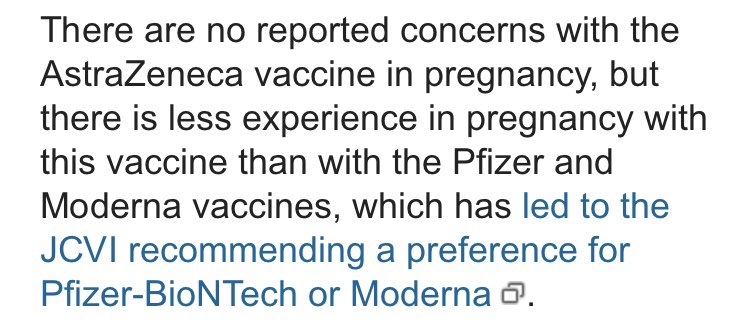
"The UK now says that #pregnant people should be offered the Pfizer or Moderna #COVID19 #vaccines. But I already had my first dose of AZ. What should I do about dose 2?” 🧵
The official guidance says:
“Pregnant women who commenced vaccination with AstraZeneca are advised to complete with the same vaccine.”
But what is the rationale behind this? 2/
assets.publishing.service.gov.uk/government/upl…
“Pregnant women who commenced vaccination with AstraZeneca are advised to complete with the same vaccine.”
But what is the rationale behind this? 2/
assets.publishing.service.gov.uk/government/upl…
The first thing to say is that the reason we are offering Pfizer/Moderna is not because we have any data to say that AZ is unsafe in pregnancy. It’s just that we have *more* data on mRNA vaccines, so we can be more confident of their safety. 3/
rcog.org.uk/en/guidelines-…
rcog.org.uk/en/guidelines-…

In fact, between January and April, we were vaccinating pregnant ppl with AZ and tracking safety with the Yellow Card reporting scheme and no pregnancy-specific safety concerns emerged. 4/
But what about that rare clotting-related side effect associated with AZ (called VITT). Aren’t pregnant ppl at higher risk of that, since they are at higher risk of clotting anyway?
Actually, no... 5/
Actually, no... 5/
During pregnancy, tendency to clot increases because of increased clotting factors in the blood. Whereas in VITT, platelets are activated by antibodies. So the clotting occurs by different pathways. 6/
There have been no reported cases of VITT in pregnant people. 7/
assets.publishing.service.gov.uk/government/upl…
assets.publishing.service.gov.uk/government/upl…

It’s also worth noting that VITT is very similar to HIT (a reaction to the blood thinner heparin). HIT is actually less common in pregnant than non-pregnant ppl, so it’s even possible that pregnancy puts you at lower risk of VITT. 8/
ajog.org/article/S0002-…
ajog.org/article/S0002-…
This is why the JCVI recommends getting your second dose of AZ if your first dose was AZ.
But I know some ppl still feel a bit uncomfortable with this, so what are your options? 9/
But I know some ppl still feel a bit uncomfortable with this, so what are your options? 9/
Right now we do not have enough evidence on mixing and matching vaccines to feel comfortable offering ppl their second dose as an mRNA vaccine if they started with AZ.
So that’s off the table (for the time being, at least.) 10/
So that’s off the table (for the time being, at least.) 10/
Which leaves you with the option of either getting your second dose of AZ or delaying it.
So let’s think about what happens if you delay... 11/
So let’s think about what happens if you delay... 11/
Vaccine efficacy after a single dose is 76% (and 81%) after both doses. So a single dose does give you a good level of protection.
The problem is, it’s unclear how long protection will last without the booster. So that 76% may decline over time. 12/
thelancet.com/journals/lance…
The problem is, it’s unclear how long protection will last without the booster. So that 76% may decline over time. 12/
thelancet.com/journals/lance…
Because of this, I do think the JCVI’s advice, to get dose 2 of AZ, is probably the best course of action. But if you are worried and your personal risk factors for COVID (exposure, medical history) are low, you might consider delaying your second dose until after the birth. 13/
This is a discussion you should have with your care team, who can take into account these personal factors. But I hope the evidence above will provide a useful framework for those making these decisions.
As always, happy to chat about this. 14/14
As always, happy to chat about this. 14/14
PS. For signs of VITT, please see this useful graphic.
I’m afraid I can’t remember where I got it from so if anyone recognised it and knows the author, let me know so I can credit!
I’m afraid I can’t remember where I got it from so if anyone recognised it and knows the author, let me know so I can credit!

• • •
Missing some Tweet in this thread? You can try to
force a refresh









